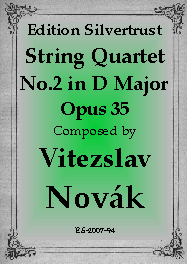Presents
Vitĕzslav Novák
String Quartet No.2 in D Major, Op.35
 Vitĕzslav Novák
(1870-1949) is widely regarded as one of the leading proponents of the Czech nationalism in music in the generation
after Dvorak and Smetana.
Vitĕzslav Novák
(1870-1949) is widely regarded as one of the leading proponents of the Czech nationalism in music in the generation
after Dvorak and Smetana.
However, as a youth, it seemed unlikely that he would become a musician having begun by hating music as a result of being brutally forced to study the violin and the piano as a young child. But a fascination for composition, which he discovered in his teens, led to his decision to enter the Prague Conservatory, where he studied with Dvorak among others. Dvorak's example of using Czech folk melody in his music to foster the nationalist cause at a time when the Czech and Slovak peoples were seeking statehood from Austria encouraged the young composer to follow this path. After graduating from the Conservatory in 1896, he traveled to eastern Moravia and Slovakia where the local folk melodies he found served as a source of inspiration for him.
String Quartet No.2 was begun in 1904 shortly after an extended stay in the forests of Wallachia. Upon its premiere, it was awarded the highest prize of the Czech Chamber Music Society of Prague. At the time, its two movement format was certainly a novelty. The opening movement, Largo misterioso, is entitled Fuga (or Fugue) by Novák himself. The fugue starts traditionally in hushed tones in a traditional way with the statement of the theme, but its breadth and pace are such that most of the time one is unaware that one is hearing a fugue. (our sound-bite from the middle of the movement illustrates this leisurely development) The theme is taken from a Wallachian folk melody but it is only upon the start of the second movement, Fantasia that one recognizes this fact. The Fantasia is actually three movements in one. It begins with a powerful Allegro passionato in which the treatment of theme from the first movement makes it clear that this is folk music. The middle section, Quasi scherzo, follows without pause and brings relief from the highly impassioned music which has preceded it. In the final section, the Fugue from the first movement returns in a truncated form and brings the music to an apotheosis.
Published over a century ago and out of print for more than 50 years, we are pleased to present this extraordinary and original work suitable for both professionals and amateurs.
Parts: $24.95
Parts & Score: $31.95